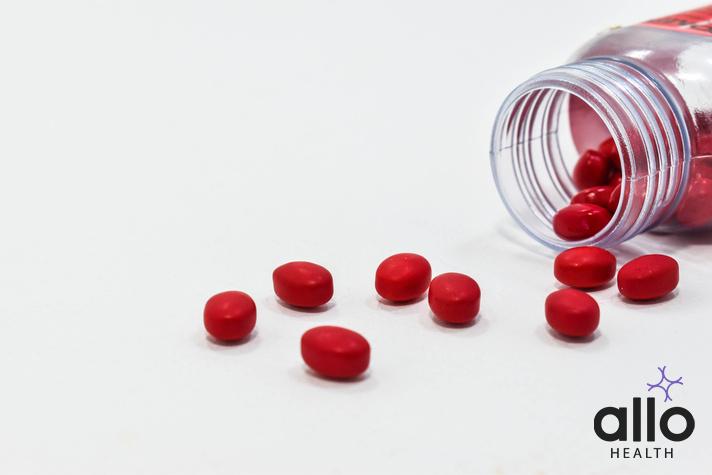Treating Syphilis With Amoxicillin: A Comprehensive Guide

Allo Health is dedicated to personalized well-being, offering support and trusted information tailored to individual health goals. The platform emphasizes human-generated content, led by a distinguished medical team of experts, including physicians and sexual health specialists. Their commitment to credibility involves rigorous fact-checking, authoritative research, and continuous updates to ensure accurate, up-to-date information. Allo Health's unique approach goes beyond conventional platforms, providing expert-led insights and a continuous commitment to excellence, with user feedback playing a crucial role in shaping the platform's authoritative voice.

Dr Sanina Mansoor holds MBBS degree from Yenepoya university,Mangalore.She has 8 years of experience working as a medical officer at various health centres and medical colleges.
Why This Was Upated?
Our experts continually monitor the health and wellness space, and we update our articles when new information became available.
Updated on 14 March, 2024
- Article was updated as part of our commitment to diversity, equity, and inclusion.

"The following blog article provides information about a drug or brand name drug and its potential effects or benefits. However, it is crucial to understand that this information is intended for general educational purposes only and should not be considered a substitute for professional medical consultation. It is highly recommended to consult with a qualified healthcare professional before making any decisions regarding medication, treatment, or healthcare management.
Book consultation
Individuals have unique medical conditions, and the information provided in this article may not be applicable to everyone. Only a qualified healthcare provider can evaluate your specific medical situation, taking into account your medical history, conducting appropriate tests, and providing personalized advice and recommendations. They are equipped to make informed decisions tailored to your individual needs.
It is crucial to emphasize that self-diagnosis, self-medication, or disregarding medical advice can have serious health consequences. This article may reference specific brand names or drugs for illustrative purposes. Mention of these names does not imply endorsement, recommendation, or guarantee of their efficacy or safety. The choice of medication should be based on discussions and individualized guidance from a healthcare professional who has a comprehensive understanding of your medical condition.
"Syphilis is a sexually transmitted infection caused by a bacterium called Treponema pallidum. It is highly contagious and can lead to severe complications if left untreated. Fortunately, syphilis can be treated with antibiotics, and one of the most commonly prescribed antibiotics for syphilis is amoxicillin. In this comprehensive guide, we’ll discuss everything you need to know about treating syphilis with amoxicillin.
What Is Syphilis?
Syphilis is a sexually transmitted infection (STI) caused by the bacterium Treponema pallidum. It can also be transmitted from an infected mother to her baby during pregnancy or childbirth. Syphilis has various stages, each characterized by different symptoms and potential health complications. The disease can be effectively treated with antibiotics, especially if diagnosed and treated in the early stages.
Here are the primary stages of syphilis:
- Primary Syphilis:
- This stage usually begins with the appearance of a painless sore or ulcer called a chancre.
- The chancre typically appears at the site of infection, often on or around the genitals, anus, rectum, or mouth.
- The sore may go unnoticed as it is painless, but it is highly infectious. It can last for 3 to 6 weeks and heals on its own.
- Secondary Syphilis:
- If untreated, syphilis progresses to the secondary stage, which is characterized by a rash that may appear on various parts of the body, including the palms of the hands and soles of the feet.
- Other symptoms may include fever, sore throat, swollen lymph nodes, fatigue, and muscle aches.
- Similar to the primary stage, these symptoms can resolve on their own, but the infection persists.
- Latent Syphilis:
- If the infection is not treated during the primary and secondary stages, it enters a latent or hidden stage.
- During this stage, there are no visible symptoms, but the bacteria remain in the body.
- Latent syphilis can last for years, and the person can still transmit the infection to others, even though they may not be aware of their status.
- Tertiary Syphilis:
- In some cases, if syphilis remains untreated for an extended period, it can progress to the tertiary stage.
- Tertiary syphilis can cause severe damage to internal organs, including the heart, brain, nerves, and bones.
- This stage can lead to serious health complications, such as cardiovascular syphilis, neurosyphilis, and gummatous syphilis.
Pregnant women with syphilis can transmit the infection to their babies, resulting in congenital syphilis. This can cause a range of serious health concerns in the infant, including developmental concerns, organ damage, and even death.
Early detection and treatment with antibiotics, such as penicillin, are crucial for effectively treating syphilis and preventing its complications. Regular testing, safer sexual practices, and open communication with sexual partners are essential in preventing the spread of syphilis and other STIs. If you suspect you may have syphilis or any other STI, it is important to seek medical advice promptly.
Syphilis Causes & Symptoms
Causes of Syphilis:
Syphilis is caused by the bacterium Treponema pallidum. The infection is primarily spread through direct contact with a syphilis sore during sexual activity. This can occur through vaginal, anal, or oral sex. The bacteria can enter the body through mucous membranes or breaks in the skin. In addition to sexual transmission, syphilis can be passed from an infected mother to her baby during childbirth.
Symptoms of Syphilis:
The symptoms of syphilis vary depending on the stage of the infection. Some people with syphilis may not experience noticeable symptoms, especially in the early stages. Here are the symptoms associated with each stage:
- Primary Syphilis:
- The primary symptom is the development of a painless sore or ulcer known as a chancre.
- The chancre typically appears at the site of infection, such as the genitals, anus, rectum, or mouth.
- The sore is round, firm, and may go unnoticed as it is usually painless.
- The chancre can last for 3 to 6 weeks and heals on its own, even without treatment.
- Secondary Syphilis:
- Secondary syphilis is characterized by a skin rash that may appear on various parts of the body, including the palms of the hands and soles of the feet.
- Other symptoms can include fever, sore throat, swollen lymph nodes, fatigue, and muscle aches.
- Mucous membrane lesions, such as mouth sores, may also be present.
- Like primary syphilis, these symptoms can resolve without treatment.
- Latent Syphilis:
- In the latent stage, there are no visible symptoms, but the bacteria remain in the body.
- Latent syphilis is divided into early and late latent stages. Early latent syphilis occurs within the first year of infection, while late latent syphilis occurs more than a year after infection.
- Although asymptomatic, individuals with latent syphilis can still transmit the infection to others.
- Tertiary Syphilis:
- Tertiary syphilis can occur years after the initial infection and can cause severe damage to organs.
- Symptoms depend on the organs affected and may include cardiovascular symptoms (aortitis), neurological symptoms (neurosyphilis), and gummatous lesions (soft, non-cancerous growths) on organs.
It’s crucial to note that not everyone with syphilis will progress through all stages, and the infection can be effectively treated with antibiotics, especially in the early stages. Regular testing for syphilis and other sexually transmitted infections, along with safe sexual practices and open communication with sexual partners, are essential for prevention and early detection. If you suspect you have syphilis or any other STI, seek medical advice promptly.

Syphilis Treatments
Syphilis is a sexually transmitted infection caused by the bacterium Treponema pallidum. The primary treatment for syphilis is antibiotics, with penicillin being the most commonly used and recommended drug. The choice of antibiotic, dosage, and duration of treatment depend on the stage of syphilis and other factors such as allergies. Here are the details of syphilis treatments:
Primary and Secondary Syphilis:
- Penicillin is the preferred treatment for primary and secondary syphilis.
- The typical regimen is a single intramuscular injection of benzathine penicillin G. The dosage may vary depending on the stage and duration of infection.
- Individuals with a documented penicillin allergy may be treated with alternative antibiotics such as doxycycline or tetracycline.
Latent Syphilis:
- Latent syphilis is divided into early and late stages. Early latent syphilis (less than one year duration) is treated with benzathine penicillin G, similar to primary and secondary syphilis.
- Late latent syphilis (more than one year duration) may require a longer duration of treatment, often involving multiple doses of benzathine penicillin G.
Neurosyphilis:
- Neurosyphilis, involving the central nervous system, requires more aggressive treatment.
- The preferred treatment is intravenous (IV) penicillin G. The dosage and duration depend on the severity of the infection.
- In cases of penicillin allergy, consultation with an infectious disease specialist is essential to determine alternative treatments, such as ceftriaxone.
Pregnant Women:
- Pregnant women with syphilis are treated with penicillin, as it is the most effective option for preventing transmission to the fetus.
- The dosage is determined based on the stage of syphilis and the duration of infection.
Follow-Up and Monitoring:
- After treatment, follow-up testing is crucial to ensure the infection has been adequately treated.
- Additional tests may be required to monitor for potential complications, especially in cases of neurosyphilis.
Partner Notification and Testing:
- Partners of individuals diagnosed with syphilis should be notified and tested for the infection.
- Preventive treatment may be recommended for partners at risk of syphilis, even if they do not show symptoms.
Seek prompt medical attention if you suspect you have syphilis or if you have been diagnosed with the infection. Early detection and treatment are critical to prevent the progression of the disease and reduce the risk of complications. Always consult with a healthcare professional to determine the most appropriate treatment plan based on your specific situation.
Treating Syphilis with Amoxicillin: A Comprehensive Guide
Amoxicillin is a broad-spectrum antibiotic that belongs to the penicillin class, and it is commonly used to treat bacterial infections. Amoxicillin is not the first-line treatment for syphilis. The preferred and more effective antibiotic for treating syphilis is penicillin.
The Centers for Disease Control and Prevention (CDC) recommends penicillin as the primary treatment for syphilis. The specific formulation of penicillin and the duration of treatment depend on the stage of syphilis and other factors. Amoxicillin is sometimes considered as an alternative in cases where penicillin cannot be used due to allergy.
Here is an overview of the use of amoxicillin in the context of syphilis treatment:
- Primary and Secondary Syphilis:
- For individuals with primary or secondary syphilis who have a documented allergy to penicillin, amoxicillin can be considered as an alternative.
- The typical recommended regimen is oral amoxicillin 2 grams, three times a day for 14 days.
- Latent Syphilis:
- For latent syphilis, especially in cases where compliance with injections (as required with penicillin) might be an concern, amoxicillin can be considered as an alternative.
- The recommended regimen is oral amoxicillin 2 grams, three times a day for 28 days.
- Neurosyphilis:
- For neurosyphilis, which is a more severe form of the infection that involves the central nervous system, intravenous (IV) penicillin is the preferred treatment.
- If there is a documented penicillin allergy, consultation with an infectious disease specialist is essential, and alternative treatments may be considered.
While amoxicillin can be used in certain situations, it may not be as effective as penicillin in treating syphilis. Penicillin remains the preferred and most reliable treatment for syphilis due to its efficacy against Treponema pallidum, the bacterium causing syphilis.
If you suspect you have syphilis or have been diagnosed with syphilis, it is imperative to consult with a healthcare professional. They will assess your specific case, including any allergies or medical history, and determine the most appropriate and effective treatment plan. Early detection and treatment are essential to prevent the progression of the disease and its potential complications.

Other Indications for Amoxicillin
Amoxicillin is a versatile antibiotic belonging to the penicillin class, and it is commonly prescribed for various bacterial infections. While its primary use is not for the treatment of syphilis, amoxicillin is effective against a wide range of bacteria. Here are several other indications for amoxicillin:
- Respiratory Infections: Amoxicillin is frequently prescribed for respiratory tract infections, including bacterial sinusitis, acute otitis media (ear infections), and bacterial bronchitis.
- Urinary Tract Infections (UTIs): Amoxicillin is used to treat uncomplicated urinary tract infections caused by susceptible bacteria.
- Skin and Soft Tissue Infections: Skin infections, such as cellulitis, and soft tissue infections can be treated with amoxicillin.
- Dental Infections: Amoxicillin is commonly prescribed for dental infections, including dental abscesses and periodontal infections.
- Gastrointestinal Infections: Bacterial infections of the gastrointestinal tract, such as Helicobacter pylori-associated gastritis, can be treated with amoxicillin as part of combination therapy.
- Lyme Disease: Amoxicillin is effective against the bacterium Borrelia burgdorferi, which causes Lyme disease, particularly in early stages or in pregnant women.
- Preventive Antibiotics Before Dental Procedures: Individuals with certain heart conditions may be prescribed amoxicillin before dental procedures to prevent infective endocarditis.
- Prophylaxis for Endocarditis: Amoxicillin is sometimes used as prophylaxis against infective endocarditis in individuals at risk before certain medical procedures.
- Post-Exposure Prophylaxis for Anthrax: In the event of anthrax exposure, amoxicillin may be used as part of post-exposure prophylaxis.
- Prevention of Recurrent Urinary Tract Infections: In some cases, amoxicillin may be prescribed for preventive use in individuals with recurrent urinary tract infections.
Always follow the guidance of a healthcare professional and complete the prescribed course of antibiotics even if symptoms improve before completion. Additionally, individuals with a known allergy to penicillin should inform their healthcare provider before taking amoxicillin.
Most Asked Questions
-
Can amoxicillin be used to treat syphilis?
Yes, amoxicillin can be considered as an alternative treatment for syphilis, particularly in cases where there is a documented allergy to penicillin. But, penicillin remains the preferred and more effective choice for syphilis treatment.
-
What is the recommended dosage of amoxicillin for syphilis?
For primary and secondary syphilis, the recommended dosage is oral amoxicillin 2 grams, three times a day for 14 days. For latent syphilis, the regimen is oral amoxicillin 2 grams, three times a day for 28 days.
-
Why is penicillin the first-line treatment for syphilis?
Penicillin is the preferred treatment for syphilis because of its efficacy against Treponema pallidum, the bacterium causing syphilis. It has been proven to be highly effective in treating the infection at various stages.
-
When is amoxicillin used in syphilis treatment?
Amoxicillin is used in syphilis treatment when there is a documented allergy to penicillin. It is considered as an alternative in specific situations, such as primary or secondary syphilis or latent syphilis, where penicillin may not be an option.
-
Can amoxicillin be used for neurosyphilis?
Amoxicillin is not the preferred treatment for neurosyphilis. In cases of neurosyphilis, intravenous penicillin is the recommended therapy. If there is a documented penicillin allergy, consultation with an infectious disease specialist is crucial for considering alternative treatments.






































